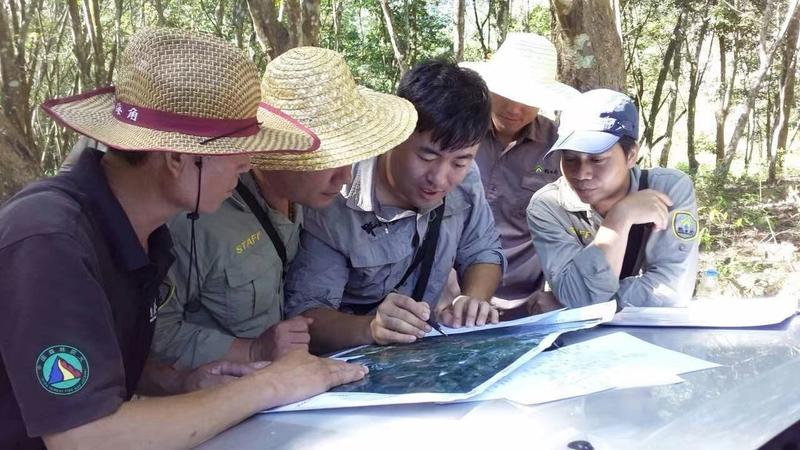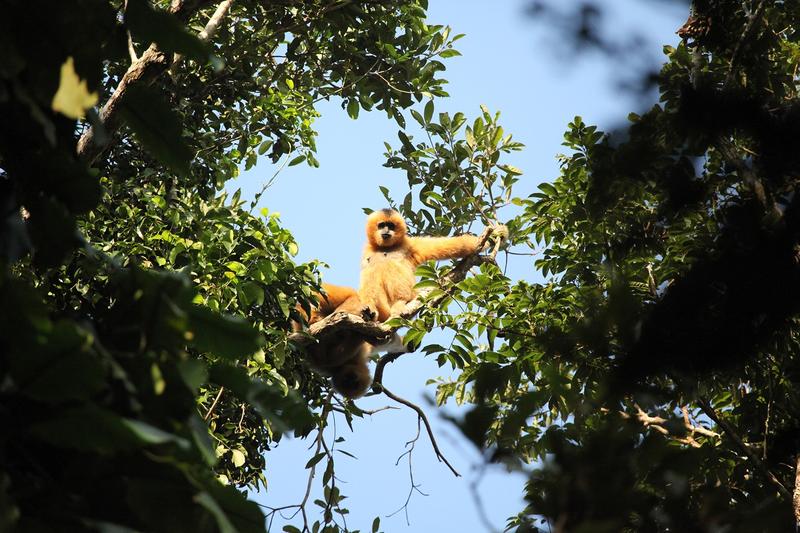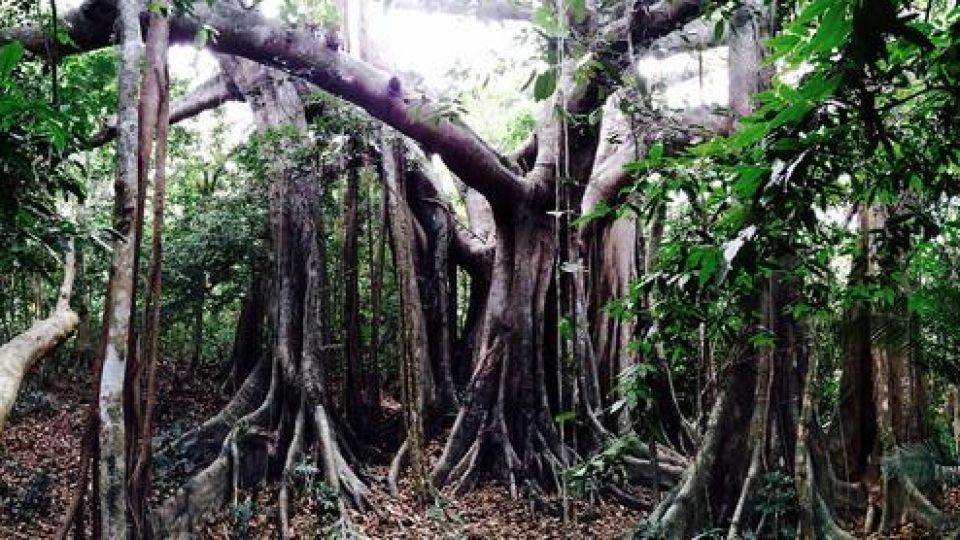June 23, 2022
BEIJING – Mi Hongxu can navigate the labyrinth of pathways at Yinggeling just as easily as its untamed denizens-a skill he has honed through years of fieldwork in the tropical forest that sits 1,400 meters above sea level, tucked deep in the interior mountains of Hainan, China’s second largest island.
Sprawling over more than 500 square kilometers, the rainforest has earned the sobriquet “water tower of Hainan” for being the source of the rivers Nandu and Changhua, which course through the island province.
There are so many species here, and they are all interconnected in ways we are yet to explore. My colleagues and I have pledged to protect them. We hope our community grows.
Mi Hongxu, a rainforest ranger in Hainan province
An abundance of natural beauty and lack of human interference make Yinggeling a paradise for flora and fauna. It is home to more than 2,000 plant and 500 vertebrate species, including more than 20 that have been found in recent years.
Lush foliage, dense undergrowth, lurking creepers and rocky outcrops-sometimes interrupted by gurgling streams-lend Yinggeling an air of romance and mystery. Tall trees, with their outstretched boughs, form dense canopies that split sunlight into myriad beams.
The Yinggeling rainforest was upgraded to a national nature reserve in 2014 and plays a key role in protecting Hainan’s ecology.
“The best 10 years of my life have been spent here,” says Mi, who is entrusted with the scientific monitoring of the reserve.
“My primary job is to keep tabs on the rich biodiversity of the area. I also offer technical training to front-line forest staff,” he says.
The ranger, in his late 30s, is said to have extraordinary observation skills. He had once spotted rare, transparent ovarian follicles of the Theloderma asperum-also known as the pied warty frog-hanging from a fallen tree trunk.

Yinggeling rainforest ranger Mi Hongxu (center) and other rangers study a map of afforested areas of the national park. (PHOTO PROVIDED TO CHINA DAILY)
Mi can almost superhumanly sense the Protobothrops mucrosquamatus-a venomous pit viper species endemic to Asia-slithering through the grass several feet away. He can identify tracks left behind by the Lophura nycthemera (silver pheasant) and the Rusa unicolor (sambar deer), both of which are under national second-class protection.
Once the sun goes down, Yinggeling teems with an even greater variety of exotic creatures.
Hence, observing nocturnal animal behavior is a principal part of Mi’s job description and he is uncompromising about keeping standards very high.
With the aid of headlamps, Mi and his colleagues have had the thrill of spotting the Rhacophorus bipunctatus (orange-webbed tree frog) and the Tylototriton hainanensis (a rare amphibian of the newt family).
“The T. hainanensis is endemic to Hainan. It is an endangered species and the discovery at Yinggeling had us excited for days,” he recalls.
Mi and his wife, Jiang Shuai, came to the rainforest in July 2012, right after they graduated. They had completed their postgraduate studies at the Northeast Forestry University in Harbin, the capital of Heilongjiang province. Mi’s focus was birds and Jiang’s microorganisms.

A leopard gecko sits on Mi’s camera during a night tour. (PHOTO PROVIDED TO CHINA DAILY)
Like most of their classmates, the couple had received good job offers in Qingdao, East China’s Shandong province, after graduation. Mi was offered a position in biological product sales while Jiang had a coveted opportunity to work at a biomedicine company. “But I thought, it would be a pity if I did not put my learning of over six years to a better and more productive use,” he says.
As if destiny was eavesdropping on his thoughts, Mi received a call from one of his professors, who mentioned job opportunities at Yinggeling.
“I did a bit of research and knew this was it. The rainforest was our calling,” he says.
Mi didn’t waste time in sharing his excitement with Jiang, who wholeheartedly agreed to the idea. The duo bade farewell to the comforts of urban life and embraced the challenges of living in a jungle.
Nature put them to test from the very beginning. While tagging along with senior rangers in the mountains, Mi was bitten by an insect. “My arm itched, but the bug was too small to be taken seriously. A cardinal mistake,” he recalls.
The skin irritation quickly spread and left him with a very painful inflammation. “Lesson learned, I never ignore signs and symptoms now,” he adds.

Mi gives a lecture to local students about nature. (PHOTO PROVIDED TO CHINA DAILY)
For Jiang, it was a nightmare come true when she fell down a slope and into a pit infested with leeches.
“I came out dizzy and bleeding, covered in wounds, some of which had leeches still attached to them. Just thinking about it makes me shudder,” she says.
Far away from the security of city life, Mi and Jiang lost weight. But, as days passed in the wilderness, the couple’s survival instincts grew.
They came up with ideas to ward off pesky insects. A piece of cloth dipped in concentrated saltwater and wrapped around the end of a stick became a remedy in case of leech encounters. The salt acted as an active disinfectant and prevented wounds from festering.
It took the couple around four months to fit into the rhythm of things, including forest protection and team management.
“Yes, the conditions were hard, but they made us what we are today,” Mi says.
“We are one big family now, helping one another through thick and thin,” he adds.
Over the years, Mi and his team have trekked through dangerous mountains and dark woods to capture heartwarming wildlife moments on camera.
Right now, Mi is sorting information on dragonflies.
“It is a joint investigation project with the Chinese Academy of Sciences. An illustrated handbook on the dragonflies of Yinggeling will be published later this year,” he says.
Last year, the team conducted butterfly and freshwater fish surveys. “The objective was to collate data for research and conservation,” Mi recalls.

A Hainan gibbon found in Yinggeling rainforest in Hainan province. (PHOTO PROVIDED TO CHINA DAILY)
Yinggeling is home to a large number of butterfly species, whose population growth mirrors the ecological balance of the area. Freshwater fish too is an important indicator of a rainforest ecosystem, he explains.
It goes without saying that Mi has been a major driving force behind the series of illustrated books published, and documentaries broadcast, on Yinggeling’s rich biodiversity.
“We take photographs and make videos during our fieldwork. I figured these could be put to use to make people aware of the need to protect our forests,” Mi says.
Since the first bunch of college students walked into Yinggeling for scientific studies in 2007, the rainforest operation has enjoyed a regular infusion of young blood. Promoting research was a part of the local administration’s strategies to protect nature and wildlife from commercial logging and poaching. In 2019 alone, the reserve received seven students who dedicated themselves to the development of the Hainan national park.
Years of collective endeavor has finally paid off. Advanced conservation ideas have been promoted among villagers who inhabit the peripheral areas of the rainforest. Hundreds have become rangers, sworn to protect Yinggeling.
Some have learned farming techniques to reduce dependence on forest produce.
Fu Hongjiang, a local villager, has picked up green cash crop planting and beekeeping skills.
“I am planning to scale up production,” Fu says.
Mi says he is looking forward to more young people joining his team to stand guard over the mountains and protect the rainforest.
“There are so many species here, and they are all interconnected in ways we are yet to explore,” he says. “My colleagues and I have pledged to protect them. We hope our community grows.”


